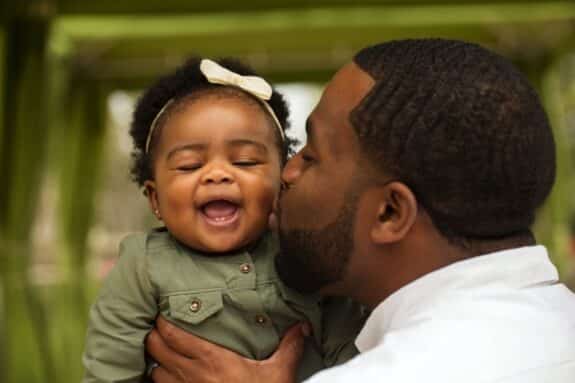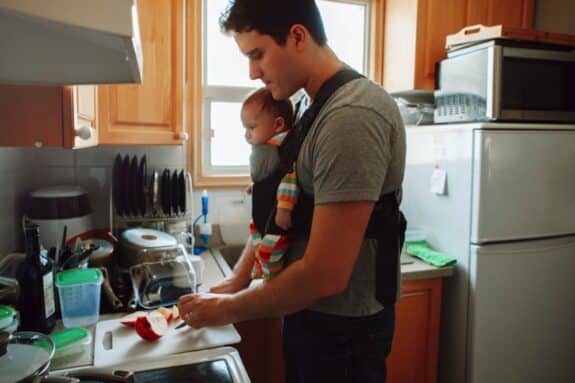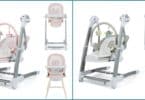Few studies look at the integral role that fathers play in the lives of their children, but one recently published in the journal Pediatrics highlights just how important they really are.
Researchers examined data on 250 dads. Dr. Craig Garfield, a pediatrician at Lurie Children’s Hospital of Chicago and professor at Northwestern University’s Feinberg School of Medicine, said moms knew active support could improve outcomes for their babies.
They’ve been participating in the Pregnancy Risk Assessment Monitoring System (PRAMS) survey for more than 30 years. Conducted by the Centers for Disease Control and Prevention, it gathers basic data from mothers before, during, and after birth.
“The moms actually started to write in the margins of the survey,” Garfield said. “The only question they asked (originally in the survey) about dads was: ‘Did your partner hit, kick, beat or slap you during your pregnancy?’”
“We focused on breastfeeding and infant sleep because they are two key national health targets,” said lead study author Dr. John James Parker, pediatrician, internist and researcher at Northwestern.
The American Academy of Pediatrics recommends that infants:
- Always be placed on their backs to sleep.
- Sleep only on approved surfaces (cribs, bassinets, bedside sleepers).
- Never sleep on soft bedding or surfaces.
- Have no soft items nearby (i.e. blankets, pillows, stuffed animals).
Following these safe sleep practices has been proven to reduce the risk of Sudden Infant Death Syndrome (SIDS), which results in as many as 3,400 infant deaths per year.
The study found that, while 99 percent of fathers put their children to bed, less than a quarter followed these recommendations. Racial disparities were found in these results, but the researchers did not examine the reasoning behind this. Ultimately, though, the study highlights there is a need for paternal education.
“I think that more needs to be done in this space to understand some of the reasons between the disparities,” Parker said. “But I think one scenario that we’ve seen play out is that racial and ethnic minorities have less availability to things like paternity leave … so it’s possible that it gets harder to get to appointments, or to be at the newborn nursery, the OB-GYN office.”
Dads can also have a dramatic effect on a mother’s breastfeeding success. Interestingly enough, they don’t have to do much outside of offering encouragement and support.
“Fathers who wanted their infant’s mother to breastfeed, 95% reported breastfeeding initiation and 78% reported breastfeeding at (eight) weeks, which is significantly higher than fathers who had no opinion or did not want their infant’s mother to breastfeed, of whom 69% reported breastfeeding initiation and 33% reported breastfeeding at (eight) weeks,” study authors said.
Some of the ways they can help is by helping with household chores and by ensuring the mother has food, water, and a comfortable environment.
“We’ve made a lot of progress, promoting the importance of women in the workplace,” Parker said. “And I think to continue that — and for it to be as accessible — we need to have fathers who are equal parents and contributing in many ways at home.”
Dr. Jennifer Lansford called the results “sobering.”
“We’re still not meeting guidelines and recommendations for these very basic physical caregiving practices,” said Lansford, director of the Center for Child and Family Policy and research professor in the Sanford School of Public Policy at Duke University in North Carolina.
She did not participate in the study, but she’s done previous research on parenting cultures across nine different countries. She says evidence shows that the U.S. lags behind.
“For example, in this country, we still don’t even have universal paid leave for mothers, let alone for fathers,” Lansford said. “Even if individual parents want to do the best they can … we don’t always have societal supports in place that let that be possible.”
She says dads should be seen as more than simply “helpers” to mothers.
“More contemporary views suggest there are healthier ways to think about fatherhood — fathers are important in their own right, not just as helpers for mothers.”
Northwestern researchers are already taking the first step. They’re looking to expand their research into other states.
“It took the CDC and the country 35 years to recognize we had a very biased — and not gender equal — approach to collecting this data,” he said. “My hope is (that it’s not another) 35 years till we start to understand what’s happening in (all) sorts of families.”








